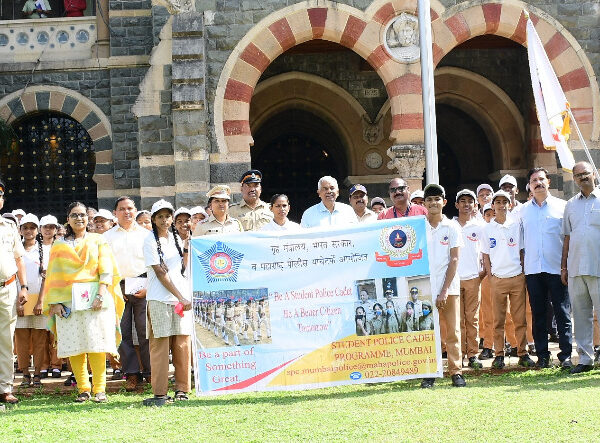STUDENT POLICE CADET PROGRAMME
Student Police Cadet Programme in Maharashtra –
In Maharashtra State, Student Police Cadet (SPC) programme was initiated in 2019. SPC Programme is being run effectively under the supervision of shri sanjay kumar DGP, (Trg. & Spl. Units) in Maharashtra state. At present, 996 schools has been enrolled under this programme. Total 84,347 students of 8th and 9th standards have participated in indoor and outdoor training under the programme. In addition to that, field visits and other activities are also conducted regularly. SPC is run by State level monitoring committee and District level monitoring committee. District Nodal officers assist schools for smooth running of the programme. SPC programme in district is closely monitored by District Level Monitoring Committee. State level monitoring committee was constituted with Principal Secretary (Spl. Home Dept.) shri. Sanjay saxena as chairman, Principal Secretary (School Edu. & Sport Dept.) Shri. Ranjit Singh Deol as member and shri sanjay kumar DGP, (Trg. & Spl. Units) as the member secretary for the SPC project.SPC Curriculum and Pedagogy-
The course curriculum for the Student Police Cadet Programme has been formulated by BPR&D. The curriculum is to be imparted over a period of two years, i.e., in classes 8th and 9th. The Student Police Cadet Programme has been implemented in Government and Central Schools. These schools could be in urban/municipal areas or in rural/panchayat areas, including digital learning modules related to meilleurs casinos en ligne français safety awareness. The State level Monitoring Committee shall take a decision on the number of schools to be covered in each such area, subject to the allocation of funds being made for the purpose.

State Level Monitoring Committee

Shri. Anup Kumar Singh
Chairman
Principal Secretary (Special)
Home Dept.

Shri. Ranjit Singh Deol
Member
Principal Secretary
(School Edu. & Sports Dept.)

Shri. Rajkumar Vhatkar
Member Secretary
Addl. Director General of Police
(Training & Spl. Units)
SPC training programme-
SPC training consists of a two-year programme with a focus on developing health and physical fitness, instilling social values, exploring inner capability, and inculcating community living skills within students. There are three components of the programme, viz. Physical (Outdoor) Training, Indoor Training (Study Classes), Field Visits.
Allotment And Utilization of Funds –
Funds have been allotted to the States under the Modernization of Police Forces scheme for implementation of the Student Police Cadet Programme. These are thus subject to the sharing pattern between Centre and States applicable to the MPF scheme.
An allotment of Rs.50,000/-per annum may be made to each school for the above purpose including conducting outdoor activitys. Out of this amount, a sum of Rs.16,000/ may be earmarked for teaching aids, another Rs.24,000/- for outdoor activities, Rs.5000/-for training and the balance for contingency. These funds should be made available to the Principal of the school who shall furnish a Utilization Certificate1 of the amount.These funds are to be used strictly for training and teaching aids including expenses incidental to the same.
Governance Structure-
A State level Monitoring Committee headed by the Additional Chief Secretary/ Principal Secretary (Home) / Commissioner (Home) shall be constituted along with the Additional Chief Secretary/ Principal Secretary (School Education) and Director General of Police to lay out broad policy objectives and operational guidelines. The Committee shall also monitor the progress of the programme.
There shall be a Steering Committee at the District level to implement the Student Police Cadet Programme under the Chairmanship of the District Magistrate with the Commissioner of Police/ Superintendent of Police and the District Education Officer/ DI of Schools as Members. The Commissioner/ Superintendent of Police shall nominate a Nodal Officer, not below the rank of a Sub-Inspector, to coordinate and liaise with the schools and other relevant stakeholders for implementing the Programme.
Features–
- The SPC Project is an association between the educational and law enforcement authorities in a community.
- The project is composed of a structured two-year training programme to develop students as responsible citizens who manifest respect for the law, civic sense, empathy for vulnerable sections of society, and resistance to social evils as lifelong personal habits.
- The project creates youth willing to react against social evils by ensuring safe and healthy academic environments, drug-and narcotic-free premises and reinforcement of positive values among students in schools.
- The project stimulates parents and community leaders to work in cooperation with law enforcement authorities to create safe and healthy communities
- The project catalyses community-level activities to promote better use of natural resources, by encouraging habits that are minimally harmful to the environment.
- The project makes use of existing law enforcement infrastructure to promote the physical, psychological and educational development of youth.

Cadets
Schools

DNOs


